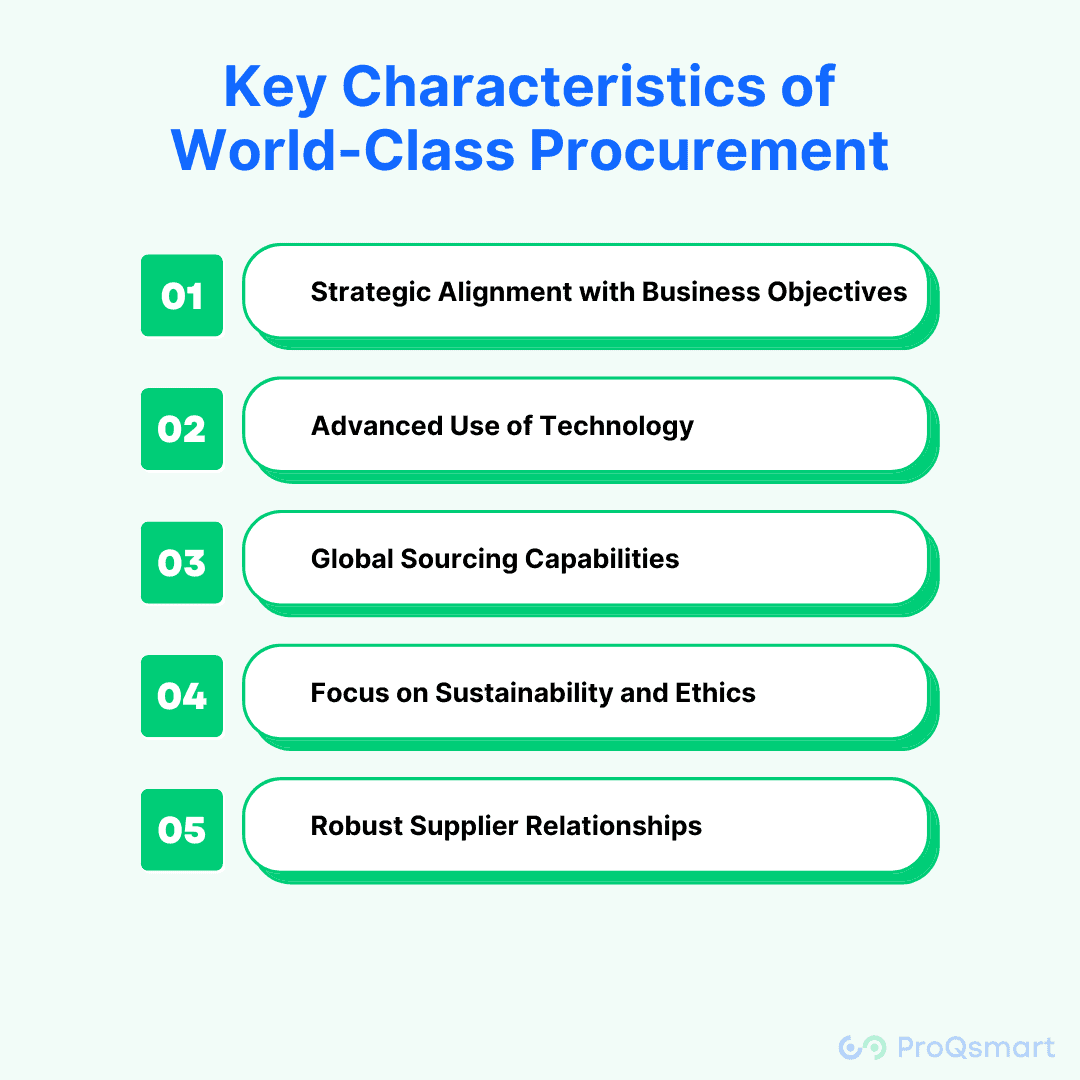Procurement characteristics of sourcing organizations are critical to the success of businesses, especially in a globalized market. A world-class procurement organization not only supports a company’s bottom line but also drives strategic value. This blog explores the essential characteristics and attributes that define world-class procurement and how they can be integrated to enhance business operations.
Defining World-Class Procurement
World-class procurement organizations excel in managing and optimizing sourcing and procurement activities to support the overall strategy of a company. They are characterized by their ability to efficiently source globally and align procurement practices with the business’s goals.
Key Characteristics of World-Class Procurement

Strategic Alignment with Business Objectives
World-class procurement is seamlessly integrated with a company’s strategic goals, contributing to overall success and competitiveness.
Advanced Use of Technology
Leveraging the latest in digital procurement solutions, such as AI and data analytics, to enhance decision-making and operational efficiency.
Global Sourcing Capabilities
Ability to manage and optimize global sourcing networks to reduce costs, mitigate risks, and ensure quality.
Focus on Sustainability and Ethics
Commitment to sustainable sourcing practices and upholding ethical standards throughout the supply chain.
Robust Supplier Relationships
Strong, collaborative relationships with suppliers to foster mutual growth, innovation, and resilience.
Attributes of Functional Product Sourcing
In addition to broad characteristics, specific attributes directly impact the functionality and success of product sourcing:
Cost Management
Expertise in negotiating and achieving the best pricing without compromising quality or supplier relationships.
Quality Assurance
Systems and processes to ensure the sourced products meet required standards and regulations consistently.
Risk Management
Proactive identification and mitigation of risks in the supply chain, including geopolitical risks, market fluctuations, and supply disruptions.
Innovation and Continuous Improvement
Continuous search for innovative solutions and improvements in sourcing processes to maintain and enhance competitive advantage.
The Role of Technology in Procurement Sourcing
Technology is a cornerstone in the transformation of procurement into a world-class function. Key technological tools include:
eProcurement Systems:
Automate and streamline procurement processes, from requisition to payment.
Supply Chain Analytics:
Provide insights into spending patterns, supplier performance, and market trends to inform strategic decisions.
Collaborative Networks:
Platforms that facilitate real-time collaboration with suppliers and internal stakeholders globally.
Best Practices for Achieving World-Class Status
To elevate a procurement organization to world-class status, consider implementing the following best practices:
Develop Talent and Skills:
Invest in training and development to equip the procurement team with the skills needed for modern procurement challenges.
Implement Strategic Sourcing:
Adopt a strategic approach to sourcing that includes comprehensive market research and supplier evaluation.
Foster a Culture of Innovation:
Encourage a culture that embraces change and innovation, and is agile enough to adapt to evolving market conditions.
Conclusion
A world-class procurement organization is distinguished by its strategic alignment with business goals, technological prowess, and a holistic approach to managing global sourcing and supplier relationships. By adopting these characteristics, procurement can transform from a support function to a strategic entity driving business success.
FAQs
What makes a procurement organization world-class?
Integration with strategic business goals, advanced technology usage, global sourcing capabilities, focus on sustainability, and strong supplier relationships.
How does technology impact procurement organizations?
It enhances efficiency, improves accuracy in decision-making, and facilitates better communication and collaboration across the supply chain.
What are the benefits of strategic sourcing?
Cost reductions, improved supply chain resilience, enhanced product quality, and fostering of innovation.
Why is sustainability important in procurement?
It ensures long-term viability, meets regulatory and consumer demands, and helps mitigate risks associated with environmental and social issues.
How can procurement drive business value?
By aligning its operations with business strategies, optimizing costs, and enabling the company to adapt quickly to market changes.
Leave a Reply